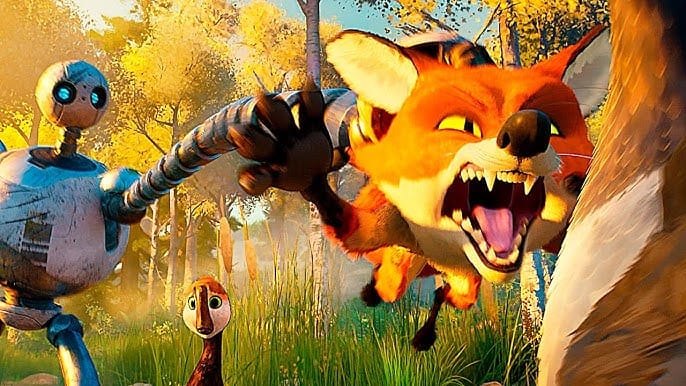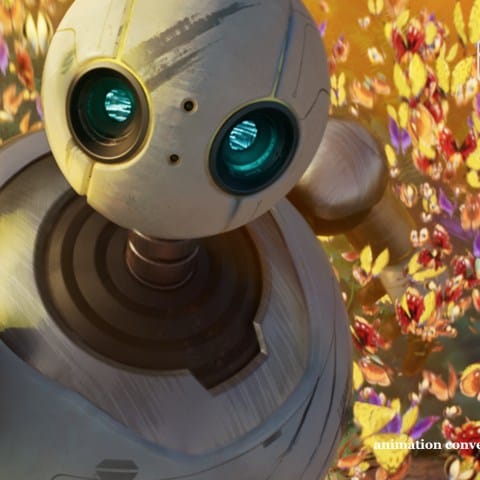How Roz’s Process Equals Human Development and Close to home Turn of events
In Peter Earthy colored’s clever The Wild Robot, Roz, a mechanical robot, sets out on an extraordinary excursion of endurance, variation, and profound development. Abandoned on a uninhabited island, Roz at first works as a customized machine, zeroed in simply on rationale and proficiency. Nonetheless, as she cooperates with the regular world and structures connections — especially with the stranded gosling, Brightbill — Roz develops into a mindful, compassionate, and sincerely shrewd being. Her story reflects the human experience of development and profound turn of events, representing subjects of self-disclosure, strength, compassion, and the quest for association.

This exposition investigates how Roz’s process matches human development by inspecting her advancement from mechanical programming to profound profundity, her variation to challenges, her improvement of connections, and her inevitable change into a mindful and sympathetic being. It likewise features how her process mirrors the widespread human journey for character, profound satisfaction, and a feeling of having a place.
- Beginnings: Innocence and Adaptation
Roz’s process starts with her enlivening on the island subsequent to being incidentally actuated. She begins as a clean canvas, working exclusively through her programming to get by and explore her environmental elements. Similar as a youngster experiencing the world interestingly, Roz notices, learns, and adjusts to the new climate.
Her underlying communications with the island’s creatures are set apart by misconception and dread — repeating how people, as youngsters, should figure out how to fabricate trust and explore social connections. For instance, Roz is seen as a danger by the creatures, featuring the pressure among innovation and nature. In any case, rather than withdrawing, Roz adjusts, showing flexibility and a readiness to learn, similar as how people develop through perception and experience.

This phase of Roz’s improvement matches the beginning stages of human close to home development, where interest and transformation are fundamental for endurance. Her capacity to gain from her environmental elements mirrors how people retain information and conduct from their current circumstance, establishing the groundwork for more profound close to home and social turn of events.
2.Emotional Awakening: Building Relationships
Roz’s reception of Brightbill marks an essential second in her excursion, addressing her shift from mechanical rationale to profound profundity. At the point when she finds the stranded gosling, Roz feels a sense of urgency to really focus on him, despite the fact that nurturing isn’t essential for her programming. This choice implies her initial move toward close to home development, reflecting the human progress from self-concentration to really focusing on others.
Raising Brightbill requires Roz to foster sympathy, persistence, and flexibility — characteristics that are not prearranged however emerge from her encounters. She figures out how to support, secure, and show Brightbill, resembling the course of human profound development as people figure out how to shape significant connections and focus on the prosperity of others.

Roz’s relationship with Brightbill features the groundbreaking force of providing care, a subject well established in human turn of events. Similarly as guardians develop genuinely through bringing up youngsters, Roz advances through her job as a parental figure, figuring out how to offset liability with adoration and trust.
- Facing Challenges: Resilience and Growth
All through the novel, Roz experiences various difficulties, from unforgiving climate to hunter assaults. Every snag expects her to adjust, issue tackle, and push past her mechanical constraints. Her strength reflects the human ability to develop through misfortune.
For example, Roz’s capacity to gain abilities to survive from the creatures around her reflects how people obtain information and close to home strength through experience. She constructs covers, safeguards Brightbill, and structures coalitions with different creatures, showing flexibility and determination.

These encounters equal the human course of defeating difficulties, where close to home development frequently comes from confronting troubles. Roz’s process highlights that difficulties are not snags but rather potential open doors for learning, development, and self-disclosure.
- Emotional Intelligence: Understanding and Empathy
One of Roz’s most significant changes is her improvement of the capacity to understand anyone on a profound level. At first, she depends entirely on rationale, however her collaborations with Brightbill and different creatures train her to perceive and answer feelings.
For instance, when Brightbill confronts dread and weakness, Roz gives solace and consolation — ways of behaving that go past her programming. She likewise exhibits compassion by intervening contentions among the creatures and safeguarding the more fragile ones.
This capacity to understand people on a profound level mirrors human improvement as people figure out how to decipher feelings, answer expressive gestures, and construct connections in view of trust and sympathy. Roz’s development features the significance of close to home associations in characterizing personality and reason, both for people and for fake creatures.

Her advancement likewise brings up issues about the eventual fate of man-made reasoning and creating the capacity to understand anyone on a profound level potential. Roz’s process recommends that machines, similar to people, can develop genuinely through experience and communication, testing conventional thoughts of being alive.
- Self-Discovery and Identity
As Roz adjusts to life on the island, she starts to scrutinize her motivation and personality. At first characterized by her programming, Roz bit by bit finds her own office and moral compass. Her process mirrors the human mission for self-revelation, where people wrestle with inquiries of personality, significance, and having a place.
Roz’s inner turmoil mirrors human encounters of development, where individuals frequently rethink themselves in light of connections, difficulties, and encounters. Her change from a customized machine to a mindful and sympathetic being matches the human excursion toward mindfulness and independence.

This topic additionally resolves more extensive inquiries regarding innovation and character. Roz’s capacity to advance proposes that fake creatures can foster qualities generally connected with mankind, obscuring the line among human and machine.
- Sacrifice and Emotional Maturity
Roz’s choice to forfeit her security for Britain’s prosperity denotes the apex of her close to home turn of events. She focuses on adoration and obligation over self-protection, showing a degree of close to home development that mirrors human development.
This penance represents the human limit with regards to charitableness, where people carry on of sympathy and obligation as opposed to personal circumstance. Roz’s activities mirror the profound development expected to really focus on others, safeguard the defenseless, and go with hard choices.
Her eagerness to place Britain’s requirements over her own features the general subject of magnanimity, underlining the groundbreaking force of adoration and association in profound turn of events.
- Harmony Between Nature and Technology
Roz’s reconciliation into the island’s environment represents the expected congruity among innovation and nature. Her process recommends that machines, similar to people, can figure out how to coincide with the normal world through sympathy and understanding.
This subject equals the human need to offset innovative headway with natural obligation. Roz’s capacity to adjust and live as one with the island features the significance of manageable turn of events and moral advancement.

Her process urges perusers to imagine a future where innovation upholds instead of disturbs nature, encouraging connections in light of care and regard.
Conclusion
Roz’s excursion in The Wild Robot fills in as a strong illustration for human development and close to home turn of events. Her change from a modified machine to a mindful, sympathetic being mirrors the human experience of picking up, adjusting, and shaping connections.
Through her cooperation with Brightbill and the regular world, Roz exhibits versatility, the capacity to understand individuals on a profound level, and self-disclosure — characteristics that characterize human development. Her story features the significance of compassion, obligation, and association, both in self-improvement and in the plan of future advances.
Eventually, Roz’s process moves perusers to ponder being human, encouraging them to move toward innovation with empathy and reason. It offers expect a future where machines and people can coincide, gaining from each other and filling together as one.